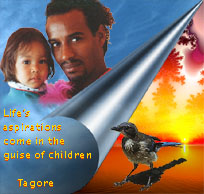| Pathways
to Peace
Teach
Men to Talk |
| Article
#6
in our series Creating Less Violence |
 |
| Victor
La Cerva, MD, the Mediacl
Director of the Family Health Bureau of the State of New Mexico,
retired, is the author of two books, a figurehead in the Men's Wellness
movement and father of two lovely teenagers. Victor lectures nationally
on violence prevention and shares his expertise and experiences
with visitors to this segment of Pathfinders.
For
information contact us at:
|
|
TEACH MEN TO TALK
Statistics concerning men's health are poignantly revealing. Men, compared with women, experience much higher rates of morbidity and mortality due to heart disease, substance abuse, and violence—all of which have their origins in emotional repression. The release of emotions, on the other hand, is believed to contribute to well-being. Studies in psychoneuroimmunology are beginning to show that positive emotional states increase the number of healing cells circulating in the body. Laughter and improved mental outlooks alone can help reverse the course of some progressive illnesses. A convergence is presently occurring in our country. Mainstream medicine is slowly acknowledging that body, mind, emotions, and spiritual perspective are interconnected, and that dis-ease in one of these realms produces symptoms in another. The men's movement has arrived at the same conclusions. The Men's Movement The endeavor to achieve male health and well-being is nourished by four taproots: mythopoetic artistry, Jungian archetypes, twelve-step wisdom, and body-based emotional release techniques. The life force of the movement emanates from thousands of small support groups around the country. Here, men meet regularly to talk about important matters in their lives. Over time, they experience trust, acceptance, and respect from other males, instead of competition, put-down, and violence. Many Men Are In Pain They live in isolation with few, if any, close friends. To varying degrees, they have bought into destructive cultural beliefs about masculinity and are stuck in the male box that emphasizes "power over" and "control" as the operative behaviors for men. They have become trapped in mind-sets that stifle growth. Sturdy as oaks that feel no pain and need no help, they endure until their hearts attack them. Or they act out their stress by abusing their children, express control through domestic assault, or power through acquaintance rape. They commit suicide because they can't admit they are hurting, or homicide in response to a remark that bruises their fragile sense of self. Or they get lost in a maze of addictions to subdue the inner turmoil. Most of these men are success objects running a competitive maze, searching for perfection, confused by a material world that does not leave them time for satisfaction. Losing themselves, men lose the ability to care for the earth and be active, loving family members. Lacking inner peace, they wage war, endlessly draining away the precious resources needed to fight the poverty and disease they are running from. Talking Is Transformative Health statistics, together with the ordinary events in the lives of men, indicate that change is urgently needed. More than anything else, men require tools to use in forging ahead to new awareness. One of the most handy and functional tools available is articulation. Talking helps us gain access to ourselves. Telling our stories and listening to those of other men shed new insights into ways to conduct our lives. Talking together, we find that we are sons, fathers, lovers, grandfathers; some of us have sex with women, some with men, some with men and women. And beneath our differences, we discover that we are all men. As such, the archetypal beings, warring, magician, and wildman hold secrets for us in their hands. Mentors and elders, too, have the power to resurrect for us ancient aspects of maleness. We want to know how to become heroes, healers, brothers, and friends. We yearn to awaken and integrate the feminine aspects of ourselves. Bringing these desires to fruition requires a stable, ongoing source of support—a forum that encourages us to express how we are feeling about our life path and how we are grappling with the difficulties before us. Talking about our journeys keeps us on course. It also serves to reduce male violence. Talking, essential at each juncture of a man's journey, is more critical than ever during the transition to fatherhood. The powerful forces at play on the threshold to fatherhood bring a man face to face with the gifts and the wounds received from his parents. Feelings about how he was parented are sure to arise, and in sharing them he will be able to increase his consciousness about the new role he is undertaking. Expectant and new fathers alike desperately need a safe space in which to express their hopes and fears. Fortunately, fathering centers are springing up around the country to support men as they connect with this nurturing part of themselves. Older men who have raised children are also stepping forward as trail guides. Still, much more counsel is needed, especially for teen fathers who may be overwhelmed by the difficulties of parenting, or by the extraordinary range of emotions it stirs up. Every man has inner wisdom: he has encountered pain and survived. Now he must learn the language of feelings. Where he learns to express himself does not matter, provided that it takes place in a supportive atmosphere on a regular basis. The journey toward wholeness begins with a willingness to enter the darkness within; embrace our shadows; explore the contours of our anger, fear, and joy; and talk out, rather than act out, the emotions we have held hostage since childhood. THE NEW MALE MANIFESTO
Literature Full-Time Dads, a periodical available by calling 207-829-5260. Heinowitz, Jack• Pregnant Fathers: Entering Parenthood Together. San Diego, CA: Parents as Partners Press, 1995. Kauth, Bill • A Circle of Men: The Original Manual for Men's Support Groups. New York: St. Martin's Press, 1992 • Sam Keen, Fire in the Belly. New York: Bantam Books, 1991 • Kivel, Paul. Men's Work: How to Stop the Violence That Tears Our Lives Apart. Center City, MN: Hazelden Publishing Group, 1992 • Mead, Michael. Men and the Water of Life. New York: HarperCollins, 1993 • Sonkin, Daniel, PhD. Learning to Live without Violence: a Handbook for Men. Volcano, CA: Volcano Press, 1989 • Zilbergeld, Bernie. Male Sexuality. New York: Bantam Books, 1978. Organizations Abusive
Men Exploring New Directions (AMEND), 303-932-6363 • Domestic
Abuse Intervention Project, 218-722-4134 • EMERGE,
617-422-1550 Victor La Cerva, MD ©Victor La Cerva 2000 |
|
|
|
